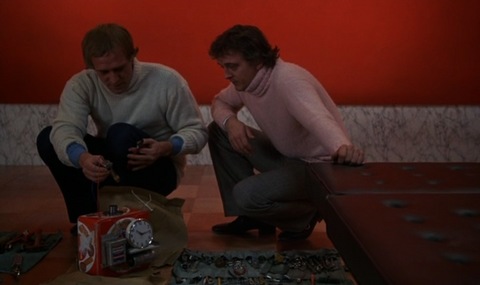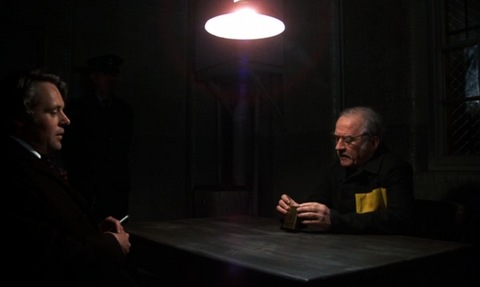I believe this is the last of my reviews of early Hitchcock films for the Monthly Film Bulletin that I’ve transcribed, after The Ring, Blackmail, and Number Seventeen; this one appeared in the July 1975 issue. –J.R.


Murder
Great Britain, 1930 Director: Alfred Hitchcock
Hitchcock has described Murder as his “first and only whodunit”, accounting for his antipathy to the form with the complaint that it “contains no emotion”, and bringing to mind Edmund Wilson’s comparison of reading several with unpacking “large crates by swallowing the excelsior in order to find at the bottom a few bent and rusty nails”. Certainly the most evident lack in this 1930 movie — apart from the creakier aspects of the play which it adapts — is the sort of emotional continuity and momentum of controlled viewpoints which sustained Blackmail so brilliantly the previous year, and the more dubious cerebral rewards offered in their place are not quite enough to fuse its comparable experiments into a consistently workable style. After an effective, rather UFA-inspired opening (prompted, no doubt, both by Hitchcock’s work at the German studio in the mid-Twenties and by the fact that he concurrently shot a German version of Murder entitled Mary), which features a lengthy dolly past the windows of neighbors responding to a mysterious commotion, the film mainly tends towards a stagier conception of dialogue units which the various stylistic departures often inflect rather than unify, thus usually registering as isolated “touches”. Read more
This review originally appeared in the October 1974 issue of Monthly Film Bulletin. —J.R.


Juggernaut
U.S.A., 1974 Director: Richard Lester
A disconcerting aspect of Richard Lester’s last feature, The Three Musketeers, was the evidence of a director trying to play several separate games — and please several separate audiences — at the same time, often leading to a diffusion of interest as the film briskly bounced from one tone or style to another. Juggernaut, clearly designed as nothing more or less than yet another ship-disaster blockbuster, is a marked improvement in this respect, because however unoriginal its base ingredients, it hardly ever slackens its pace or diverts attention from its central premises. After a rather deceptive Petulia-like opening — the camera panning up the legs of a girl trombonist in the band celebrating the Britannic’s launching, followed by a string of typical Lester vignettes extracted from the surrounding fanfare (mainly “overheard” one-liners singled out on the soundtrack and disembodied somewhat from the visuals, giving them a certain resemblance to comic-strip bubbles) — the plot settles down to the cross-cutting techniques common to the genre, and the short gags (e.g., two children on the boat playing a flipper machine called “Shipwreck”) are used thereafter a bit more sparingly. Read more
This is the 8th bimonthly column I’ve published in Cahiers du Cinéma España; it ran in their September 2008 issue. — J.R.

Ever since I retired from my twenty-year stint as a film reviewer at the Chicago Reader, I’ve been reluctant to see new releases, either as a freelance reviewer or as an ordinary spectator. One reason for this attitude is a reaction to having been obliged for so long to see many hundreds of films I had no personal interest in, many of which I gratefully forgot about shortly after submitting my reviews. Another motivation is that I’m usually so happy seeing or reseeing older films, most often on DVD, that it’s hard to find many new films that are equally enticing.
Undoubtedly my age and physical laziness both play roles in this bias, but I honestly think that the diminishing quality of commercial releases also has a significant influence. I’m not saying that there’s been a decline in cinema more generally — apart from such factors as the eclipse of the Hollywood studios or (for example) the increasing censorship in Iran — because I think it’s arrogant to make such sweeping generalizations on the basis of the tiny fraction of what gets made that one has access to. Read more





